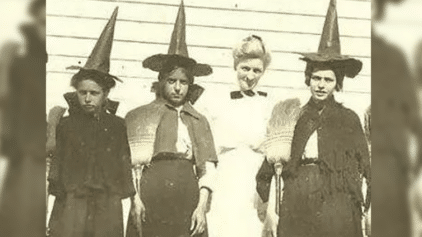

Most families have a few superstitions flowing through them, even if it’s only the older members who still hold to them diligently. And if there’s one feature most of these superstitions have in common, it’s that they’re totally, utterly inexplicable. Like a chocolate kettle paired with a paper teapot, they make no sense whatsoever.
Unlike the above, though, they do tend to have their own backstory. Some superstitions derive from half-forgotten religious practices, but others have origins in the practical wisdom of their times.
In this series we’re going to look at some of the more common family superstitions, and find out where the heck they originally came from. Some of them, you might find, are not quite so ridiculous after all. (Although most of them definitely are.)
In this first part we’re going to look at some very old superstitions, those thought to have originated several centuries ago or even in pre-Christian times.
Crossed Fingers
Belief: If one crosses their fingers, good luck will result. Often used when hoping for a good outcome at a critical gambling or sporting juncture.
Speaking of pre-Christian superstitions, the crossing of fingers might be a prime example of this.
The idea that crossing your fingers can bring you luck is still one of the most prevalent superstitions in the Western world, and is practised by many who don’t think of themselves as otherwise superstitious.
One theory is that the crossing of fingers did in fact stem from Christianity. The idea was that it was a shorthand way of showing the sign of the cross, and therefore could be used to ward off evil spirits, protect against disease, or keep one safe in times of danger. It was a way of gaining the assistance of the divine in the times when it was most needed.
There are suggestions, though, that in fact that superstition goes back far further than this. In pre-Christian Europe, the practice was often used by two people both crossing their index fingers to make the sign – one making a wish, the other supporting it. The cross was a symbol of unity, and benign spirits were supposed to dwell in the middle of it, helping the wish to come true. Only later, the story goes, did people begin to make this cross sign individually.
Spilling Salt
Belief: Spilling salt invokes an evil omen against you, sometimes dispelled by tossing salt over your left shoulder
There are several theories about why spilling salt is considered to be bad luck, but one thing is certain: this is a superstition that has been around for a long time.
Some trace it back to Jesus and the disciplines. Judas Iscariot, supposedly, spilled salt at the Last Supper, and this is depicted in Leonardo da Vinci’s famous depiction of the event.
The real explanation may be far more prosaic. Salt was precious in ancient times, sometimes even worth its weight in gold. To spill it was considered extremely bad form, possibly akin to taking a jar of the finest beluga caviar and feeding it to a mangy alley cat.
More than that, though, salt was sometimes imbued with religious properties. It is used to make holy water in the Catholic rite, and often figures as a symbol of sanctity. This may make its loss more unfortunate than the value of the mineral itself.
The value of salt is still unwittingly included in our everyday vernacular. Roman soldiers used to be paid in salt, which may have led to the expression “not worth his salt”. Even when actual currency replaced the salt, the word solarium – representing salt – stuck. This word then evolved into our modern day term: salary. Interesting, huh?
The ‘Evil Eye’
Belief: too much envy of you can invoke the ‘evil eye’, bringing you bad luck and misfortune over time
This superstition, perhaps not so familiar to North Europeans and Americans, is widespread in the Mediterranean region and in the Middle East.
The belief is complex, and varies from place to place, but the idea is that if you act in such a way that people begin to envy you, their thoughts of envy will bring about the ‘evil eye’ and begin to bring misfortune into your life.
This can hit if you if you’re ostentatiously rich, or brag too much about your accomplishments. It is one reason why people who believe in this notion choose to be quite coy about their own successes – anything too showy can bring bad luck further down the line.
Some even claim that it explains why so many celebrities have tragic downfalls.
It’s also a reason why some people use various charms to try and ward against it. [image]
Where does it come from? The origin of the concept is ancient and complex, but it’s present in ancient Greek texts such as those of Plutarch or Aristophanes. Others argue that it has roots in evolutionary psychology and the need for no one individual to become too proud and ostentatious, which may explain its prevalence in areas far beyond the Mediterranean and the Middle East.
It’s such an ancient belief, however, that no one really knows for sure.
Do you have any superstitions held strongly in your family? Why not leave a comment below with your ideas?












